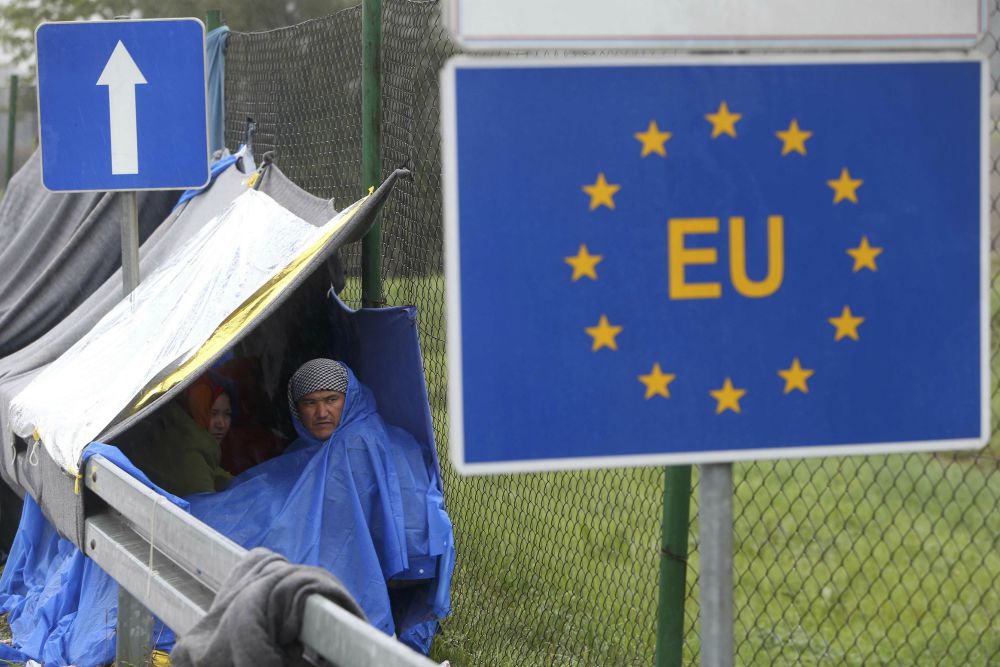
A European Union sign is seen Oct. 19, 2015, as migrants wait to cross the border to Slovenia from Trnovec, Croatia. (CNS/Reuters/Srdjan Zivulovic)
When citizens of the European Union vote for a new continental parliament in late May, Catholic Church leaders will be hoping that the outcome endorses the bloc's continued existence but also sends a strong signal about much-needed change.
With the drama over Brexit dragging on, it is still unclear whether British voters would be taking part. For the rest of the EU's 27 member-states, however, the new 751-seat European Parliament, sitting until 2024, will be tasked with rebuilding unity and stability, while easing tensions over refugees and migrants and the faltering euro currency.
These tensions are felt acutely among Catholics.
"The church has generally been positive about European integration, but views are divided as to which form this integration should take," explained Msgr. Piotr Mazurkiewicz, a Polish expert and former secretary-general of COMECE, the Brussels-based Commission of the Bishops' Conferences of the European Community. "Although efforts are made to present the common thinking of bishops across the Union, church members have contrasting hopes and expectations in countries such as France, Germany and Italy. These can generate significant differences."
Turnout has traditionally been low in elections, favoring parties with a robust approach to European issues. At the last ballot in 2014, almost two-thirds of members were replaced in a bid for new ideas. This time, far-left and far-right groupings are expected to gain at the expense of longer-established parties. They're likely to arrive with radical demands for a shake-up in the EU, whose rotating six-month presidency is currently held by Romania.
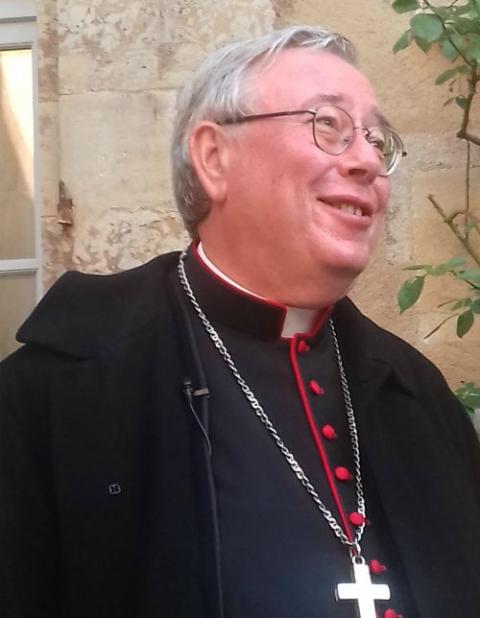
Archbishop Jean-Claude Hollerich of Luxembourg (Wikimedia Commons/Olivier LPB)
While Brexit will, for the first time, reduce the EU's size, it'll also enhance the bloc's Catholic composition, with Catholics making up 59.5% of its combined 446 million-strong population.
COMECE's latest president, Archbishop Jean-Claude Hollerich of Luxembourg, has urged "everyone happy with life in the EU" to make sure they vote in the May 23-26 elections. He's also appealed for a spirit of compromise and a recognition that the EU requires "deep reform" if it's to head off the kind of disaffection which fueled the June 2016 Brexit vote.
"At present, there's still a firm acknowledgement, especially in Eastern Europe, of the political, economic and security benefits of membership," Mazurkiewicz told NCR. "But recent events have shown the EU can't go on functioning this way, and that fundamental reforms must be worked out responsibly over time. So we can be moderately optimistic things will indeed change after these elections."
When Pope Francis addressed the European Parliament in November 2014, he warned of "growing mistrust" towards the EU's "aloof institutions" and lamented that the "great ideas which once inspired Europe" had been "replaced by bureaucratic technicalities."
Since then, ethical and social issues, from religious freedom to family norms, have continued to preoccupy church leaders; and while these officially fall outside the EU's competence, there've been fears that attempts are being made to encroach on them.
Resolutions have been tabled in the Strasbourg Parliament linking abortion rights, same-sex marriage and gender-neutral teaching to the receipt of EU funds, in an apparent infringement of treaty clauses.
Modified rules on data protection have pressured the church to conform with EU employment and education norms, raising the possibility that canon law could be trumped by the bloc's anti-discrimination rules in areas from sex education to female ordination. Church-owned schools may see their Catholic ethos undermined under a projected EU directive requiring them to accept pupils equally from non-religious backgrounds.
In June 2018, the EU's European Court of Justice sparked church protests by ruling same-sex married couples should have equal residence rights in predominantly Catholic countries which only recognize heterosexual unions.
Article 17 of the Treaty on the Functioning of the EU, signed in 2007 in Lisbon, Portugal, requires the EU to recognize the identity and "specific contribution" of churches and religious organizations, and to maintain "an open, transparent and regular dialogue" with them.
This has facilitated top-level consultations, such as in October 2017 when 350 church representatives and EU officials met in Rome under the Vatican's patronage for a "constructive reflection on the way forward."
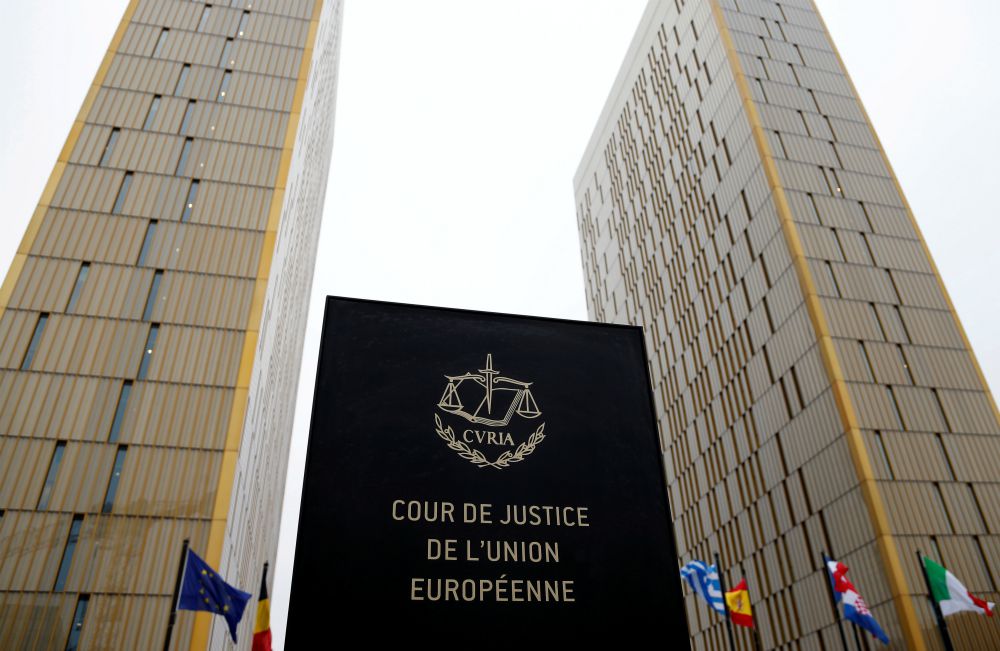
The towers of the European Court of Justice are seen in Luxembourg in 2018. (CNS/Reuters/Francois Lenoir)
Church's place in EU
Up to now, the Catholic Church's EU policy has been shaped and directed by COMECE, founded in Brussels in 1980, which has vigorously backed ever closer integration. In a February statement, COMECE urged the continent's citizens to end their "sterile confrontations" and help "relaunch the European project."
"The Catholic church has been part of the European construction for over two millennia, contributing through its social doctrine," said the commission, which has vice-presidents from the Czech Republic, Germany, Ireland and Italy, and a French secretary-general, Dominican Fr. Olivier Poquillon. "The Lisbon Treaty opened an array of new possibilities, whereas the current mood, faced with many uncertainties, seems less optimistic. But the 2019 European elections come at the right moment to make political choices."
In an accompanying report, COMECE called for a "clear long-term vision" in a range of areas, such as employment, migration and asylum, social mobility and environmental degradation, as well as digital technology, artificial intelligence, cyber-security and fake news. And it set out dozens of policy recommendations for making the continent "more social and innovative," while taking account of changes in Europeans' "cultural and anthological self-understanding."
It was time to take "courageous decisions," COMECE insisted, if trust was to be preserved in "traditional political actors and institutions," if the EU's "institutions and structures" were to be renewed, and if "polarizing and divisive voices" were not to grow louder.
Some have questioned whether COMECE's staunchly pro-EU stance properly reflects Catholic views, and whether it can claim to speak for the whole church in apparently endorsing a federal Europe.
On April 8, Catholic military bishops met under COMECE's guidance with Gen. Claudio Graziano, chairman of the EU's Military Committee, to discuss "respective military realities" and "enhance co-operation towards a shared strategic culture."
Is the Catholic Church at risk of being co-opted as just another of the EU's large elite-dominated institutions?
Some, like Mazurkiewicz, admit such dangers exist but are confident they can be controlled if COMECE's voice is balanced by those of individual bishops' conferences, speaking out in their own way.
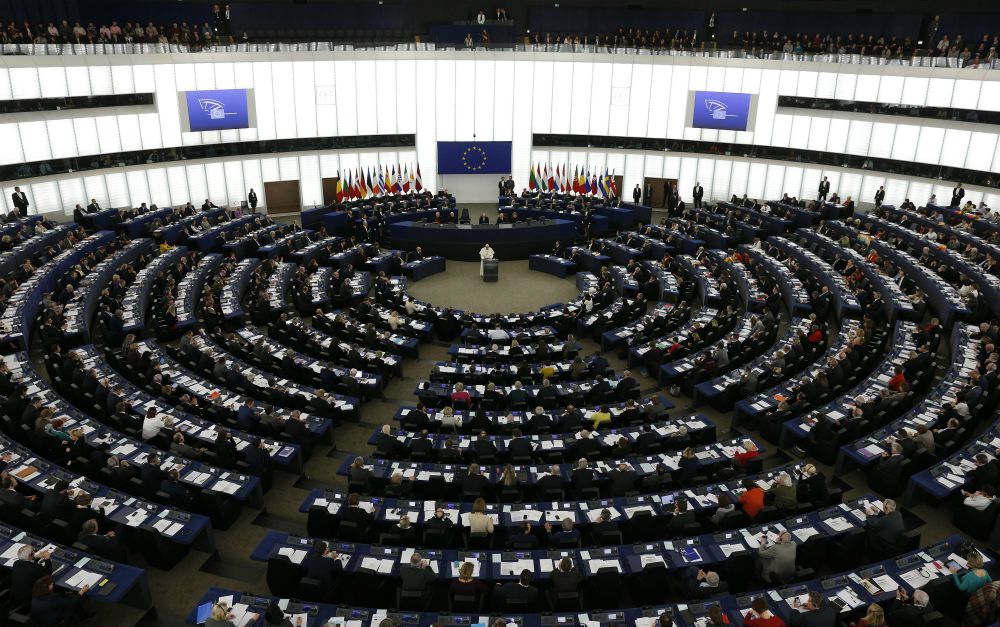
Pope Francis addresses the European Parliament in Strasbourg, France, Nov. 25, 2014. (CNS/Paul Haring)
Demographic, economic shifts causing tensions
Whereas the church remains firmly rooted in Poland, and can afford to take a conservative approach to most public issues, in neighboring Germany, the church is losing members fast and has gone along with calls for liberal reform. In traditionally Catholic countries such as Italy and Spain, meanwhile, the church's national presence carries strong political overtones, whereas in Britain and northern Europe it's seen as marginal to political debates.
In March, Catholic bishops from Germany, France and Switzerland joined forces to debate "current forms of reception of a European common good," and appealed for an analysis of the current "loss of interest" in European unity.
In mid-April, Romania's bishops also issued their own pastoral statement, warning the outcome of the upcoming European elections could go either way — "weakening or strengthening links" between member-states and bringing citizens "closer or further apart."
In March, the Conference of European Justice and Peace Commissions, grouping 31 national organizations, conceded the EU's single free market had generated an "enormous increase in material wellbeing" continent-wide, but warned that trust in European institutions would be lost if the process lacked clear rules and an infrastructure for ensuring the common good.
Its report painted a dire picture of social exclusion and unfairly distributed wealth and opportunities, with hourly labor costs ranging from 4.90 euros in Bulgaria to 42.50 euros in Denmark.
Plans for economic convergence had stalled in the face of growing regional disparities, the conference warned, while 88 million tons of food, more than a fifth of all produce, were wasted annually across the EU, in "a scandalous illustration of the negative side effects of prevailing modes of production and consumption."
While EU countries, led by Germany, France and Britain, currently account for 24 percent of global arms exports, frequently violating the EU's 1998 code of conduct in issuing licenses, EU-based multinationals were also intervening politically to gain access to natural resources worldwide, and "achieving impunity in human rights violations."
"The single market is not functioning well from the perspective of the EU's values and principles, or the social teaching of the church," the Conference of European Justice and Peace Commissions statement said. "The next European Parliament should address these issues vigorously."
Regional disparities have also fueled political tensions.
In Eastern Europe, the governments of Poland and Hungary remain mired in conflict with EU officials over allegedly high-handed methods of rule, while harsh criticisms have also been directed against the Czech Republic and Slovakia.
Advertisement
Some analysts predict a crunch moment will come in 2022 or 2023, when countries like Poland — whose 4% to 5% annual growth rate, the EU's highest, has been assisted since 2014 by a $375 billion EU investment package — have to begin contributing to EU coffers themselves, propelling the first real debate of the benefits and costs of membership.
There've been tensions in Western Europe as well, notably over the rise of far-right parties such as Germany's Alternative für Deutschland (AfD), now topping polls in eastern parts of the country, and Spain's Vox party, which entered the Cortes parliament in April 28 elections, pledging to combat immigration, as well as "supremacist feminism and gender totalitarianism."
Far-right parties are already in power in Italy and Austria and have a strong parliamentary presence in other countries, including Sweden and France.
In April, led by Italy's deputy premier, Matteo Salvini, head of the far-right Northern League, they announced a new European Alliance of Peoples and Nations, which could challenge the European Parliament's familiar division between center-right and center-left alliances.
Parties of the far-left have also gained ground in countries from Spain to Greece, in what some analysts see as a growing rift between "cosmopolitans" and "communitarians" — those seeing themselves as Europeans, and those holding fast to national distinctness.
And while some disparage the new groupings as "populists" and "extremists," others believe some broadening out of the democratic process is inevitable, if alternative worldviews and value-systems are to be fairly represented.
The rise of anti-establishment parties has sparked varied reactions in Europe's Catholic Church, with some bishops voicing alarm and others cautious optimism.
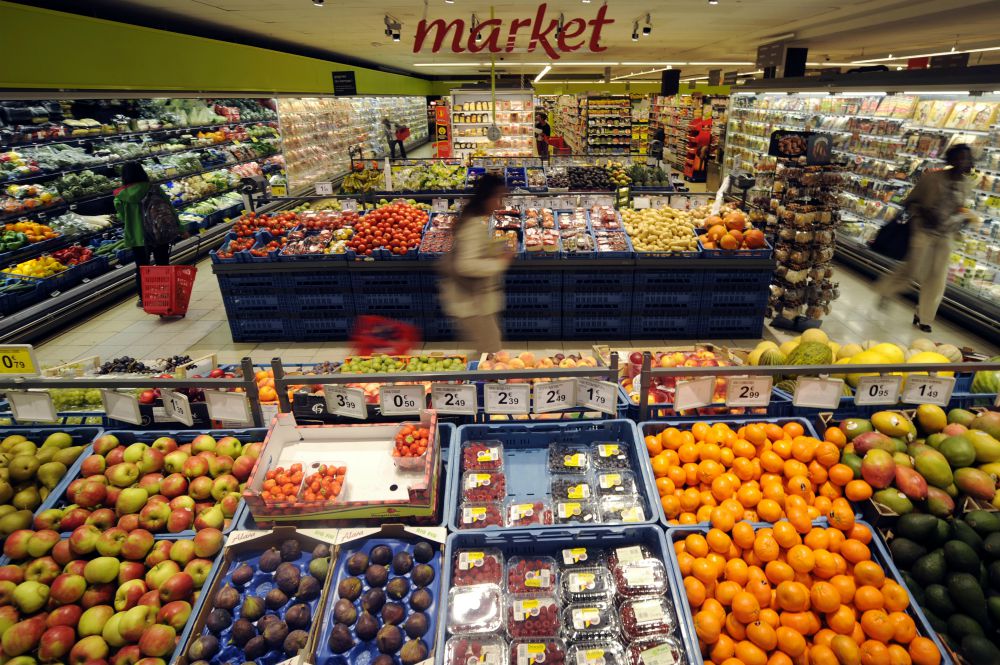
The produce department of a grocery store seen in Brussels Sept. 4, 2014: Catholic justice and peace commissions called for greater attention to social justice across the EU, urging political leaders to take steps to curb food waste, arms exports and multinational abuses. (CNS/Reuters/Eric Vidal)
"The really radical and extremist groupings generally stand a long way from Christianity, making it hard to see how the church could attach any expectations to them," said Mazurkiewicz, the Polish expert. "But some new parties have sensible ideas about reform and argue that, after decades in power, the elites need shaking up. If Christian elements in these quarters emerge stronger after the latest elections, we may see the EU taking with a more sympathetic attitude to religion, family life and national identity."
Some Catholics think Britain's dramatic referendum vote to quit the EU in 2016 highlighted latent tensions and frustrations at work in all member-countries, which were ignored and brushed aside for too long.
If the EU merely seeks to outmaneuver and discredit them, it could win a victory in the short term. But it's likely to lose in the long run if it fails to engage with legitimate concerns and reveals itself as an undemocratic power-bloc rather than a free association of sovereign states and nations.
In its February statement, COMECE urged voters from the EU's member-states "not to fall into the temptation of looking inward," but also called on European institutions to "work together for a common destiny, going beyond divisions, disinformation and political instrumentalization."
"Unity in diversity implies common rules that account for legitimate protection and promotion of freedoms and liberties, through democratic practices that exemplify accountability, transparency and a just application of the rule of law," said the Catholic bishops' commission. "European public authorities should not be seen as imposing unilateral decisions from outside, but rather as favoring the personal and collective engagement of all citizens in a true, creative and respectful dialogue."
[Jonathan Luxmoore covers church news from Oxford, England, and Warsaw, Poland. The God of the Gulag is his two-volume study of communist-era martyrs, published by Gracewing in 2016.]





